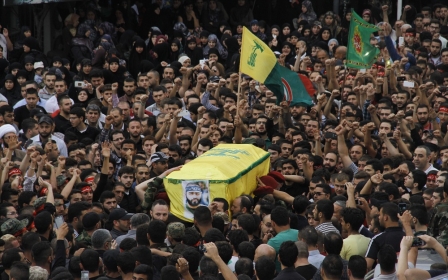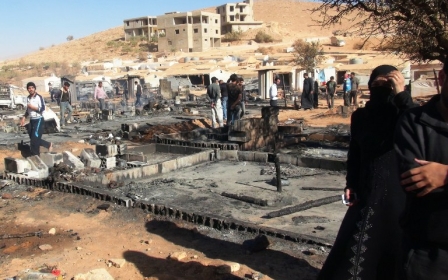Lebanon’s Marine Corps renaissance

Last week, the Marine Corps Times ran the following headline: “Beirut mission renewed: Marines take pride in returning to guard embassy.”
According to the article, the reinstatement of US Marines as full-time guards at the US embassy in Beirut after more than 30 years “is a notable milestone for those who fought to maintain stability in Lebanon, a country oft-wracked with religious and ethnic tensions.”
“Stability,” of course, is the perennially stated objective of US policy vis-à-vis Lebanon. In practice, said policy includes things like annual multibillion dollar donations and rush shipments of weapons to the state of Israel, which intermittently uses its presents to batter Lebanon and other Arab territories.
The Marines’ previous full-fledged fight to allegedly “maintain stability” over 30 years ago occurred in the context of US military intervention in the Lebanese civil war under the guise of peacekeeping—a guise that was difficult to maintain when US warships started shelling select ethno-religious groups.
In his autobiography My American Journey, former US Secretary of State Colin Powell remarks on the USS New Jersey’s contributions to the Lebanese conflict in 1983, when it began “hurling 16-inch shells into the mountains above Beirut, in World War II style, as if we were softening up the beaches on some Pacific atoll prior to an invasion.”
Powell observes that, logically, “[w]hen the shells started falling on the Shiites, they assumed the American ‘referee’ had taken sides against them.” Also coming under fire were Druze, Palestinian, and Syrian positions, with attendant civilian collateral damage.
In response, a suicide bomber attacked the Marine Corps barracks outside Beirut, killing approximately 240 servicemen. In 2003, a US federal judge ruled that Hezbollah was responsible for the affair, acting under orders from Iran. Never mind that Hezbollah didn’t officially exist until 1985.
Back in the saddle
As contemporary history has shown us, the US fancies itself endowed with a peculiar right to attack at will but not be attacked.
The Marine Corps Times article quotes former Marine public affairs officer Fred Lash, who served in Beirut in the 1980s and who “refers to that chapter of Marine history as ‘the first battle against terrorism.’”
According to Lash, the return of full-time Marine guards to the Beirut embassy following an absence of over three decades “shows willingness on the part of the American people and State Department to stick with this diplomacy thing.”
Granted, many observers might not have been aware that diplomacy is the Marines’ “thing” given their track record as a force responsible for war crimes in Iraq and other military abuses.
Undeterred, Lash preaches: “They can knock you off the horse, and you can stay off the horse for a while, but you are going to get in the saddle again.”
The equine re-mounting presumably comes as little comfort to those in the region who are acquainted with America's own terroristic behavior—particularly when they learn that the Marine-based bolstering of security at the Beirut embassy is being replicated at numerous diplomatic posts throughout the world.
The conversion of the US embassy into even more of a fortress than it already is meanwhile upholds imperialist tradition, which also sees Lebanese roads closed and native circulation disrupted whenever the ambassador is out and about. The hubris of empire is regularly on display, as when ambassadorial convoys decide to go careening into ancient ruins.
The mindset of territorial entitlement is sufficiently conveyed in a Marine Corps Times quote from Mark Brilakis, commanding general of the Marine Corps Recruiting Command, who praises the Beirut-based Marines as “defending sovereign US soil in that embassy.”
Full circle
Brilakis, who was stationed in Lebanon at the time of the barracks bombing, contends that Beirut’s Marine renaissance is “good for the State Department and good for the Marine Corps and good for the nation of Lebanon.”
Again, this seems like a pretty optimistic statement to be made on behalf of the Lebanese given that the US and Israel are like two peas in a pod.
Current regional tensions—exacerbated by the American role in the battle against the Islamic State, the jihadist outfit it incidentally helped to create—further underscores its inherent inability to promote “stability” in Lebanon.
Although he doesn’t intend it in this way, Lash’s assessment that the Beirut redeployment “takes things full circle” could serve to remind the US military of what can potentially happen when it asserts its presence in areas in which it has engendered widespread ill-will.
And while the Marines jump back in the Lebanese saddle, Lash’s view that “[the terrorists] can do all the things in the world to make you pull out, but it is really a good feeling to go back in” begs another metaphor: Let’s keep screwing the world.
- Belen Fernandez is the author of The Imperial Messenger: Thomas Friedman at Work, published by Verso. She is a contributing editor at Jacobin magazine.
The views expressed in this article belong to the author and do not necessarily reflect the editorial policy of Middle East Eye.
Photo: People pretend to step on a man dressed in the colours of the American Stars and Strips flag, during a protest near the US embassy in Awkar, near the Lebanese capital Beirut, on 20 July, 2014, against the Israeli military offensive on the Gaza Strip (AFP)
Stay informed with MEE's newsletters
Sign up to get the latest alerts, insights and analysis, starting with Turkey Unpacked
Middle East Eye delivers independent and unrivalled coverage and analysis of the Middle East, North Africa and beyond. To learn more about republishing this content and the associated fees, please fill out this form. More about MEE can be found here.





